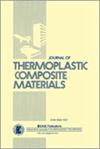Enhancing the fiber-matrix interface of r-ABS and bamboo fiber composite developed through melt compounding: An analysis of mechanical and morphological
IF 3.6
4区 材料科学
Q2 MATERIALS SCIENCE, COMPOSITES
引用次数: 0
Abstract
In recent years, researchers and scholars have shown growing interest in exploring the applications of natural fibers in polymer composites, driven by their environmentally friendly and sustainable characteristics. This study endeavors to offer an exhaustive examination of the prominent and widely adopted natural fiber reinforced polymer composites and their diverse range of applications. Furthermore, it provides an overview of different surface treatment methods applied to natural fibers and their influence on the properties of, highlighting the significant variations in properties depending on the fiber type, source, and structure. Bamboo fibers (BF) and recycled chemically functionalized acrylonitrile-butadiene-styrene (r-ABS) composites (BF/rABS) have been blended at 190°C. The composites show a higher tensile and flexural properties than r-ABS. The presence of bamboo fibers functions as stress concentrators, resulting in minimized deformation and consequently reducing the impact strength of the composites in comparison to the matrix. The SEM and FTIR analysis have shown that the adhesion between fiber and the matrix is good which therefore improves the tensile properties of the composite materials. XRD analysis has shown improved crystallinity in composite as compared to matrix.熔融复合增强r-ABS和竹纤维复合材料的纤维-基体界面:力学和形态学分析
近年来,研究人员和学者们对探索天然纤维在聚合物复合材料中的应用越来越感兴趣,因为它们具有环保和可持续的特性。本研究试图提供一个详尽的检查突出和广泛采用的天然纤维增强聚合物复合材料及其不同的应用范围。此外,它还概述了应用于天然纤维的不同表面处理方法及其对纤维性能的影响,强调了根据纤维类型、来源和结构在性能上的显著变化。将竹纤维(BF)与回收的化学功能化丙烯腈-丁二烯-苯乙烯(r-ABS)复合材料(BF/rABS)在190℃下共混。复合材料具有比r-ABS更高的拉伸和弯曲性能。竹纤维的存在起到了应力集中剂的作用,使变形最小化,从而降低了复合材料与基体相比的冲击强度。扫描电镜(SEM)和红外光谱(FTIR)分析表明,纤维与基体的粘附性较好,从而提高了复合材料的拉伸性能。XRD分析表明,与基体相比,复合材料的结晶度有所提高。
本文章由计算机程序翻译,如有差异,请以英文原文为准。
求助全文
约1分钟内获得全文
求助全文
来源期刊

Journal of Thermoplastic Composite Materials
工程技术-材料科学:复合
CiteScore
8.00
自引率
18.20%
发文量
104
审稿时长
5.9 months
期刊介绍:
The Journal of Thermoplastic Composite Materials is a fully peer-reviewed international journal that publishes original research and review articles on polymers, nanocomposites, and particulate-, discontinuous-, and continuous-fiber-reinforced materials in the areas of processing, materials science, mechanics, durability, design, non destructive evaluation and manufacturing science. This journal is a member of the Committee on Publication Ethics (COPE).
 求助内容:
求助内容: 应助结果提醒方式:
应助结果提醒方式:


